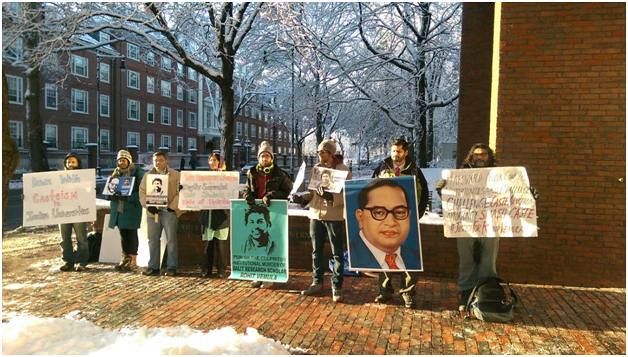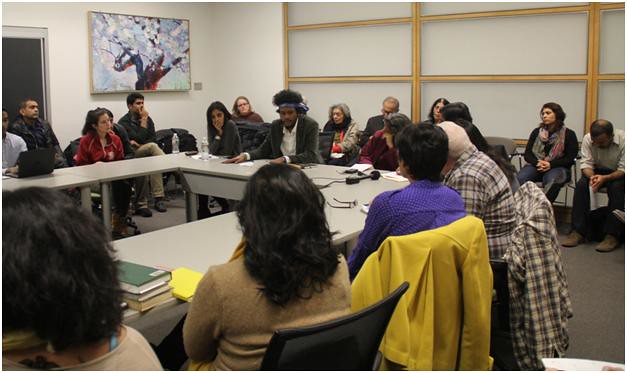By TCN News,
Cambridge (USA): The 13th annual edition of the Harvard India conference saw protests against the death of Rohith Vemula, a Dalit research scholar who was suspended by the Hyderabad Central University, leading him to commit suicide on January 17.
The Harvard Business School and Harvard Kennedy School played host to the Harvard India conference 2016 on Saturday and Sunday, which was attended by former Foreign Secretary Nirupama Rao, Union Minister for Communication and Technology Ravishankar Prasad, and Dnyaneshwar Mulay, Consul General of New York. Karan Johar and Kamal Haasan were also invited as speakers at the conference.

Focusing on Rohith Vemula’s death, the concerned academics came together under the banner of ‘Boston Against Caste’ which was co-sponsored by Boston Ambedkarites in Cambridge, Massachussetts.
“Did you know India is home to the world’s oldest surviving system of discrimination? Do you know how many Dalits (formerly untouchables), Tribals, and ‘Backward’ castes are represented at this conference – when demographically they constitute 85% of the populace?” read a flyer distributed by protestors outside the conference.

Seeing the protests, Manoj Kumar Mohapatra, Deputy Consul General of India, New York City, came out of the conference and expressed concern that protestors were projecting India in a “bad light” at a high-profile event and asked them to withdraw the protest. Mohapatra also offered to set up a meeting with the Ravishankar Prasad,Union Minister if the protest was immediately withdrawn.
However, protestors refused the offer, explaining that their protest was not against the minister but against the system of caste which is institutional in the Indian society and handed over flyers with demands to Mohapatra.
According to one protestor, Mohapatra issued a veiled threat during the conversation saying that next time any of the protestors came to the consulate for a passport they might face difficulties.

Protestors distributed more than a hundred flyers encouraging attendees to ask important questions. The flyers described the circumstances around Rohith Vemula’s death, questioned the caste position, and privilege of organisers and attendees with the following excerpt:
“..The tragic suicide of a bright Dalit PhD scholar, 26 year old Rohit Vemula an anti-caste activist at a top Indian university poses difficult questions-particularly around representation-to those involved in maintaining caste hierarchy. Ignoring these questions while eagerly claiming to represent the country in transnational settings such as these is typical of the disturbing pathology of Indian caste privilege – a sight you paid good money to behold.
One of the organisers of the protest, Vaibhav Sravade, expressed concern over the lack of response from the government after the death of Vemula. “In spite of massive protests after his death, even the minimum of demands-the sacking of the HCU Vice Chancellor Appa Rao-is being denied. This is the indifferent nature of the current regime which is completely disconnected from our concerns”, he said.
Protesters expressed anger over the fact that the government was more concerned about its image than delivering justice. They released a statement saying “unless the culture of complete impunity changes through delivery of justice and punishment of the culprits, the caste question will haunt India at every single international forum in the future”
The vocal protest outside the Harvard India conference was held only a couple of days after Harvard South Asia Institute organised a seminar on the circumstances behind Vemula’s death. There, panelists issued a call to action stating that caste discrimination in Indian campuses and the questions or representation in academia cannot be ignored anymore.
Over a dozen protests demanding criminal prosecution of culprits have occurred at various places outside India following Vemula’s death on January 17. These include Harvard University (Jan 22); Massachusetts Institute of Technology, (Jan 23); University of Michigan (Jan 23); Indian Consulate, San Francisco (Jan 23); University of Pennsylvania, (Jan 24); Stanford University (Jan 28); Washington DC (Jan 30); University of South Africa, Pretoria (Jan 22); India House, High Commission of India, London (Jan 25); Australia (Jan 25); Indian Embassy in Rome, Italy (Jan 27); and the Indian Consulate, Toronto (Jan 29).

